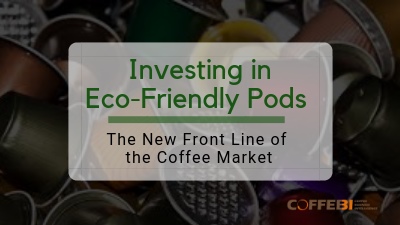Investing in Eco-Friendly Pods, the New Front Line of the Coffee Market
A wasteful industry
 Since the invention of single-use coffee pods in 1997, their market share has continued to grow and still does today, surpassing even drip coffee in 2011.
Since the invention of single-use coffee pods in 1997, their market share has continued to grow and still does today, surpassing even drip coffee in 2011.
John Sylvan, the inventor behind K-Cups (the first coffee pod created in America) explained why, at the time, this new way of drinking coffee was so appealing to the public. He described them as “a cigarette for coffee, a single-serve delivery for an addictive substance“.
Pods became popular in a matter of years and, thanks to their success, the problem of their disposal became apparent. In recent years, this issue reached public opinion, raising awareness and giving birth to the movement KillTheKCup. This movement’s sole purpose is, not so subtly, to destroy single-use pods in order to save the planet. According to the statistics posted on their website, in 2014, if we had placed each pod sold next to each other, we would have built a chain long enough to circle Earth 10.5 times. Also, in 2015, over 13 billion pods ended up in landfills around the world. This is one of the reasons that led Sylvan to state that he wished he had never invented them.
Recycling coffee pods is not as easy as it seems
It is not so simple to recycle a coffee pod. A pod is composed mainly of aluminum and plastic. In order to salvage it, the two materials must be separated. This process cannot be completed in a standard recycling center. On top of that, the aluminum recovered from the capsules can’t be used to make new ones. If left intact and sent to a landfill, your beloved coffee pods will take between 150 and 500 years to decompose!
This problem has also been acknowledged on an institutional level. In 2016, the city of Hamburg, Germany, banned the use of single-serve pods from all government buildings to try and reduce waste.
To tackle the issue, Nespresso and other big coffee retailers have started their own recycling programs by letting customers return used coffee pods to the stores or purposefully made collection centers.
Competition is high and customers are looking for an eco-friendly alternative
As with many other products, eco-friendly, fair-traded and sustainable coffee is sought after by today’s customers who are looking for the perfect cup without an aftertaste of guilt.
Many producers are now rushing to develop an environmentally friendly pod that will increase their sales without increasing the production costs.
For example, K-Cup has already vowed to make all their pods completely recyclable by 2020. As of today, however, only 5% or their production is.
The available options
From small producers to bigger companies, the range of new eco-friendly product is growing rapidly. We have now quite a few different options that let us enjoy coffee and also help reduce waste.
Let’s start from reusable pods. These are usually plastic cups with a paper filter that can be replaced after each use This allows you to toss the brewed coffee and refill it as many times as you need and also recycle the aluminum lid. Reusable pods are not used as much as one would hope because they lose all the convenience instilled into single-serve capsules.
Biodegradeable pods are as easy to use as standard single-use pods. They are a step in the right direction as they can dissolve in water over the years (sometimes up to 100%). However, the process is still too slow to be acceptable.
Compostable capsules take the biodegradable concept a step forward as all of the materials in the pod completely dissolve quickly and go back into the earth. This provides nutrients to the soil, acting as a fertilizer. There are even some made out of plant fibers which dissolve in a matter of months. The only problem with compostable pods is cost: companies will have to cope with the expenses connected with researching and developing new materials and products packaging. On top of that, compostable materials are usually pricier than mass-produced plastics.
As criticism against single-serve pods rises all over the world and customers become more and more aware of its environmental impact, it would be a fool’s errand to be left behind.
Investing in eco-friendly coffee brewing systems is the future of the market and, whoever finds the perfect solution, will end up revolutionising a sector that is expected to reach a market cap of 971 million dollars.


